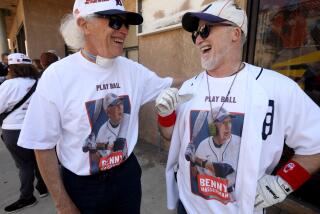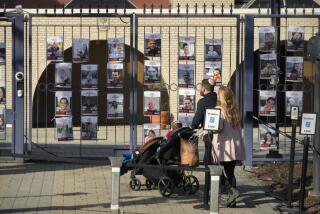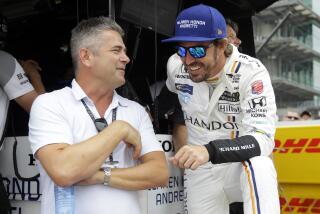Fred J. Ascani dies at 92; test pilot set speed record
Fred J. Ascani, a retired Air Force major general and former test pilot at Edwards Air Force Base who set a world speed record in an F-86 jet fighter in 1951 and later oversaw the development of a supersonic bomber, has died. He was 92.
Ascani, a B-17 pilot during World War II, died of lung cancer March 28 at his home in Alexandria, Va., said his son, David.
“The day they told me he had lung cancer, he said, ‘I’ve been brave before, and I’ll be brave again,’ ” his son said.
As a test pilot with the 3077th Experimental Group at Edwards Air Force Base, where he became director of experimental flight test and engineering in 1950, Ascani flew about 50 types of experimental aircraft.
They included the X-1, X-4, X-5 and the XF-92A, the forerunner of the delta-wing F-102.
Flying an F-86 Sabre 50 feet above ground around a 100-kilometer oval at the National Air Races in Detroit in 1951, Ascani set a world speed record for a closed course by flying 628.698 mph.
“A crowd of 91,000 gasped in awe as he streaked across the airport at the start and finish of the speed run,” the Associated Press reported.
The previous record was 605.230 mph, set in 1948.
Son David, the youngest of eight, said he always wondered what his father was doing “flying over 600 miles per hour 50 feet above the ground when he had six young kids” at the time.
But he never posed the question to his father, whom he described as family oriented and a devout Roman Catholic who valued his sense of humor “and remained to his last day fascinated with technology.”
The same year Ascani set the speed record, he became vice commander of the Air Force Flight Test Center at Edwards.
In 1954, he was named commander of the 86th Fighter Interceptor Group in Landstuhl, Germany, and a year later assumed command of the 50th Fighter Bomber Wing in Hahn, Germany.
In 1957, he was assigned to the Wright Air Development Center at Wright-Patterson Air Force Base in Ohio, where he served as deputy chief of staff, plans and operations.
Two years later, he was named director of systems engineering.
In 1961, Ascani was appointed deputy commander and system program director of the XB-70 Valkyrie supersonic bomber, which flew at three times the speed of sound and cruised at 70,000 feet. Only two aircraft were built before the program was canceled, but technology developed was used in later high-speed aircraft such as the Concorde.
In 1964, Ascani became commander of the Systems Engineering Group and deputy commander of research and technology at Wright-Patterson.
The son of Italian immigrants, Alfredo John Ascani was born May 29, 1917, in Beloit, Wis., and later moved to Rockford, Ill. A 1941 graduate of the U.S. Military Academy at West Point, he received his pilot wings in 1942.
After becoming commander of the 816th Bombardment Squadron based in Italy in 1944, Ascani flew 53 combat missions.
During a classified mission into German-occupied Czechoslovakia, he was deputy commander of a flight of sixB-17s that carried supplies to partisans and retrieved downed airmen and exiled political leaders.
Before he was assigned to Edwards Air Force Base in 1950, Ascani spent five years in the Flight Test Division of the Air Technical Service Command at what came to be known as the Wright-Patterson base.
While serving as executive officer to the commander of the Flight Test Division, Col. Albert G. Boyd, Ascani was involved in selecting a pilot to break the sound barrier -- a feat Capt. Chuck Yeager accomplished in 1947.
Ascani retired from the Air Force in 1973.
“Mentor Inbound,” a biography of Ascani by Sheryl Hutchison, a retired Air Force lieutenant colonel, was published in 2009.
Ascani’s wife of 61 years, Catherine “Kay,” died in 2003.
In addition to his son David, he is survived by three other sons, John, Bill and Stephen; his daughters, Carole Jo McDaniel, Susan Ascani, Clare Ascani and Betsy Henderson; 10 grandchildren; and three great-grandchildren.
dennis.mclellan
@latimes.com
More to Read
Start your day right
Sign up for Essential California for the L.A. Times biggest news, features and recommendations in your inbox six days a week.
You may occasionally receive promotional content from the Los Angeles Times.






